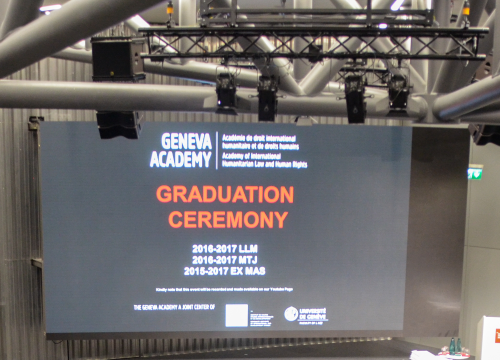Three Awards at the 2017 Graduation Ceremony for Exceptional Academic Work


Arthur Nguyen Dao
30 October 2017
We awarded, during our 2017 Graduation Ceremony, three prizes to graduating students for their exceptional academic work: the Henry Dunant Research Prize, the Best LLM Paper Prize and the Best Master in Transitional Justice (MTJ) Paper Prize.
2017 Henry Dunant Research Prize
The Foundation Prix Henry Dunant, in partnership with the Geneva Academy, awarded the 2017 Henry Dunant Research Prize to Ms Isabelle Gallino for her LLM paper entitled ‘Factors Motivating Non-State Armed Groups to Comply with International Humanitarian Law: Reflections on Positive Practices’.
This paper focuses on instances where non-state armed groups, under political and reputational considerations to achieve legitimacy, tend to respect international humanitarian law. Dealing with a topical issue, this paper, whose rigorous legal construction is based on a theoretical analysis illustrated by two practical case studies, led the jury - composed of members of the Henry Dunant Prize Foundation, the Geneva Academy and the International Committee of the Red Cross - to award the prize to Ms Gallino.

On the Photo, from the left: Cécile Dunant Martinez, Nicolas Florquin, Isabelle Gallino, Roger Durand, Marie-Caroline Fel, Etienne Kuster
2017 Best LLM Paper Prize
Ms Aida Farkas received the 2017 Best LLM Paper Prize for her exceptional academic work entitled ‘Institutional Racism under the Jurisprudence of the European Court of Human Rights: The Case of Forced Sterilization of Roma Women’.
This well researched and well documented paper provides a sound legal analysis of the jurisprudence of the European Court of Human Rights and institutional racism in cases of violations concerning persons of Roma origin, and more specifically in the context of cases of forced sterilization.

2017 Best MTJ Paper Prize
Tafadzwa Christmas received the 2017 Best MTJ Paper Prize for his exceptional academic work entitled ‘When the Law is Like a Door in the Middle of an Open Meadow’ Conceptualizing the Rule of law in the context of Customary Law in South Sudan’.
This paper provides an excellent analysis of a very relevant but largely underexplored topic in the field of transitional justice: the issue of the relation between customary law and the rule of law. Well written and extensively researched, it steers a well-argued course between romanticizing ‘the local’ and narrowly focusing on ‘conventional’ forms of law. As such, this paper makes a substantial contribution to ongoing debates in the field of transitional justice, human rights and the rule of law.

Video











